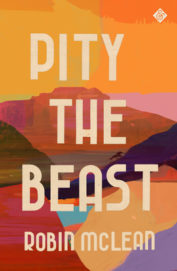Robin McLean
And Other Stories ($25.95)
by Garry Craig Powell
Exceptional books transcend the usual categories. Is Robin McLean’s Pity the Beast a modern-day western? Is it feminist? Is it postmodern? In fact it is all of these, and yet to pigeonhole it in such terms is reductive, and might, unfortunately, lead a reader to miss the complexity and richness of the novel.
The plot is almost traditional: A horrifying crime goes wrong, the victim survives and escapes, and a mounted posse sets off in pursuit, intent on finishing the job. The pitiless, graphic violence will inevitably remind some of Cormac McCarthy. But if you’re thinking Clint Eastwood movies, you’re wrong. Ruthless as the main men are, they are also educated. They philosophize, discuss Freud and Jung, and quote from Shakespeare and the Bible. One of them is gay.
These details represent surface-level departures from the conventional western, but the most meaningful difference is that the hero of Pity the Beast is a woman—although McLean is too deep and complex a writer to simply reverse the roles. While all the men in the novel commit evil deeds (with the exception of the deputy, a well-meaning greenhorn from New Jersey), perhaps the most evil character is not only a woman, but the victim’s own sister, Ella. And while Ginny, the protagonist, fights bravely, she has her own darker side too.
Postmodern in structure, Pity the Beast has several narrative strands; the main, realistic one deals with the pursuit of Ginny as she flees through the Mormoras (a fictional mountain range) towards Canada. McLean mixes in many other threads, however: the postcards written (but not sent) by the deputy to his neglectful mother; the fantasies of the Rodeo Kid, who sees himself as the hero of a Gunsmoke-style TV serial; a post-apocalyptic science fiction story about a female yeoman on a spaceship from another planet; and rational, articulate conversations between the mules in the posse’s train. The strategy of multiple plotlines always runs the risk of being labored and pretentious, and indeed, it’s not wholly successful here—the Rodeo Kid’s fantasies are not always consistent in voice, and at times the sci-fi story loses its focus and takes us too far away—but the purpose is clear. The author adds these additional narratives not to show off her cleverness, as so many writers do, but to imbue the main plot with resonance on a far grander, even a cosmic, scale.
Ultimately, this novel asks who human beings really are. The educated ranchers consider themselves deep and rational thinkers, refusing to acknowledge that they are also rapists and murderers, and—as we see in the post-climate catastrophe strand—they are blindly destroying the planet too. But the most successful of all the sub-narratives is the non-human one, that of the talking mules. It’s humorous and moving. How could one not feel compassion for the plight of such maltreated animals? Above all, it has the effect of eliding the distinction between beast and human. If beasts could talk, how different from their masters would they be? Not very much, the novel seems to imply.
The most outstanding feature of Pity the Beast, however, is the language. “Not since Faulkner have I read American prose so bristling with life and particularity,” J.M. Coetzee writes in a blurb. That’s a colossal claim, but it’s one the novel lives up to. No excerpts can do justice to the sheer richness and idiosyncrasy of the style, but in one particularly descriptive passage McLean writes, “His eyes, at least, worked miraculously well here. He saw jagged for the first time in his life, slick and mossy and huge and soaring.” Readers can also find some homespun philosophy in the book’s dialogue:
“All that’s pertinent is mixed together in the mountains,” Saul said. “Every appetite is natural. Must be. Arising as it does from a living natural being.”
“Vikings were buried at sea. The red-haired islands were solid rock.”
“Heat can cause insanity.”
“Lack of sleep.”
“The girls travelled west with the North American Indian trade.”
“Sea supremacy of Spanish galleons.”
“Books, braids, or booty.”
“Humans have strange drives.”
“Inscrutable inclinations.”
“Every appetite is natural,” Saul insisted.
“Even murder is natural, incest.”
“Must be.”
That’s the nub of it. This book is Hobbesian, bleak in vision, and if it’s not perfect, that’s because of its vast ambition. McLean is an important writer, one of the few who really matter at this precarious time in human history. She dares to think for herself, and to see things as they are, no matter how frightening that vision is.
Click here to purchase this book at your local independent bookstore
Rain Taxi Online Edition Spring 2022 | © Rain Taxi, Inc. 2022


